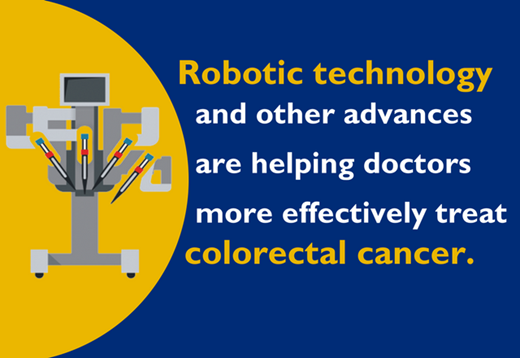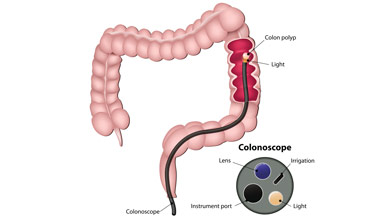Colorectal Cancer: 3 Treatment Advances to Know About
Reviewed By:
New techniques are helping doctors manage colorectal cancer better. That means less invasive procedures with more effective results.
Johns Hopkins colorectal surgeon Susan Gearhart, M.D., of the Johns Hopkins Kimmel Cancer Center explains how three types of recent surgical innovations have revolutionized colorectal cancer treatment. Be sure to talk to a knowledgeable physician to find a treatment option that is appropriate for you.

Less Invasive Approach to Colorectal Cancer Treatment
After your diagnosis, you’ll meet with your doctor to discuss staging. Staging involves imaging tests that show how far the cancer has spread. This process guides your treatment, such as whether (and which) surgery is right for you.
Minimally invasive procedures include:
- Endoscopic surgery: In an early diagnosis, colorectal cancer is typically contained to a small tumor, or polyp. A minimally invasive endoscopic procedure can treat these cancers effectively. Your doctor uses a scope to see inside your colon and then uses special instruments to remove the entire tumor.
- TAMIS: Another newer procedure performed at Johns Hopkins is called TAMIS (transanal minimally invasive surgery). During this laparoscopic procedure, doctors remove small tumors. This is an effective way to treat small rectal tumors.
While less invasive, these procedures can lead to recurrences (the disease coming back). Your doctor may recommend follow-up testing to closely monitor you after your procedure.
New Advances in Colorectal Cancer Surgery
If a tumor is large or has spread past the bowel wall, your doctor may decide surgery is the best way to treat the cancer. With new surgical techniques, doctors are better able to remove all of the disease, leading to a lower chance of recurrence. At Johns Hopkins, surgeons have perfected these techniques and can perform these complex surgeries in less invasive ways.
Advanced colorectal surgery options include:
- Laparoscopic colon resection surgery: Doctors use a small incision to take out the tumor and any lymph nodes that may be affected.
- Rectal cancer surgery: When cancer is found in the last 20 centimeters of the colon, it’s called rectal cancer. With refined techniques, surgeons now take out more of the fatty tissue around the tumor. This is a more aggressive approach and helps surgeons reach all affected lymph nodes, which can lead to a lower risk of recurrence.
- Advanced robotic technology: A robotic surgery system allows doctors to guide a robot to do rectal surgery. This enables better results in certain hard-to-reach areas — and possibly a lower chance of recurrence.
Less Invasive Treatments Mean Fewer Side Effects
While all treatments have side effects, with these more refined techniques, you may experience fewer (and less severe) side effects after surgery.
That means a lesser effect on your:
- Bladder function
- Bowel movement frequency
- Sexual function





